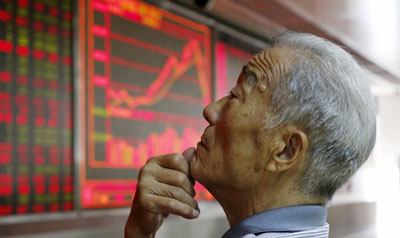Stocks Fall on China Selloff as Yuan Weakens; Commodities Slump

-
Brokerages lead losses in Chinese shares on government probes
A selloff in Chinese stocks spread across Asia as falling industrial profits and a deepening probe of the financial industry shook investor confidence in the world’s second-largest economy. The yuan weakened, while commodities slumped.
The Shanghai Composite Index tumbled as much as 5.2 percent, led by brokerages after Citic Securities Co. and Guosen Securities Co. said they were under investigation. Concern that China may get a lower-than-anticipated weighting in the IMF’s reserve-currency basket weighed on the yuan, while the euro held near a seven-month low against the dollar as traders positioned for diverging monetary policies. Oil dropped as tensions between Russia and Turkey eased. U.S. equity-index futures were little changed after the Thanksgiving holiday.

China’s economic slowdown has eroded investor confidence in Asian equity markets this year as a slump in manufacturing and commodity-intensive industries overshadowed government efforts to support growth. Odds of a Federal Reserve interest-rate increase in December are holding above 70 percent even as anticipation builds that the European Central Bank may surprise analysts with the size of its stimulus next week.
“Concern over the Chinese economic slowdown will continue to weigh on the financial markets, especially those of developing countries,” said Win Udomrachtavanich, the Bangkok-based chief executive officer at One Asset Management Ltd., which oversees about $3.5 billion. “Most investors are reluctant to take any big positions before the Fed rate decision next month.”
China’s industrial profits slid 4.6 percent last month, data showed Friday, compared with a 0.1 percent drop in September. The figure follows a deterioration in some of the nation’s earliest economic indicators for November, including a privately compiled purchasing managers’ index and a gauge based on search engine interest in small and medium-sized businesses.
Stocks
The MSCI Asia Pacific Index declined 0.8 percent at 2:24 p.m. in Hong Kong, while the Hang Seng China Enterprises Index retreated 2 percent. Citic Securities and Guosen Securities plunged more than 9 percent after the companies said they were under investigation by the China Securities Regulatory Commission for alleged rule violations, while Haitong Securities Co. suspended trading in its shares.
Signs of growing stress in China’s corporate debt market also weighed on investor sentiment as a fertilizer maker and a pig iron producer became the latest companies to flagged bond payment difficulties.
Japan’s Topix declined 0.5 percent, while Australia’s S&P/ASX 200 Index slipped 0.2 percent. Standard & Poor’s 500 Index futures increased less than 0.1 percent before a shortened trading day in New York.
Currencies
The yuan slipped about 0.1 percent to 6.3945 per dollar in onshore trading. The International Monetary Fund’s executive committee is scheduled to meet on Monday to decide on the yuan’s weighting in the lender’s basket of reserve currencies. The market consensus is for 10 percent because of the Chinese currency’s limited usability, according to Mizuho Bank Ltd. strategist Ken Cheung. He predicts anything less than that will cause the currency to weaken.
The euro was little changed at $1.0618 after weakening about 0.3 percent this week. The common currency is set for its longest-ever stretch of weekly declines versus the yen before ECB policy makers meet on Dec. 3. Reports Friday are forecast to show industrial confidence in the region deteriorated in November, while annual price pressures in Spain remained negative.
Commodities
The Bloomberg Commodity Index retreated 0.4 percent. Lead dropped 0.8 percent in London, while nickel declined 2.6 percent and zinc slumped 0.9 percent. Industrial metals had rallied this week as China considered measures to support prices near the lowest in years, including state purchases, output cuts and a probe into short-selling.
Oil pared its first weekly advance in a month, with futures falling 1.3 percent to $42.48 a barrel in New York. Russian President Vladimir Putin signaled his country will cooperate with the broader alliance against Islamic State after meeting his French counterpart in Moscow on Thursday. Separately, Libya’s National Oil Corp. said it’s making progress to resume pumping crude after more than a year from two fields including Sharara, the OPEC member’s biggest.
Bonds
U.S. Treasuries rose, with yields on 10-year notes declining about two basis points to 2.22 percent. The probability the Fed will increase its benchmark by its Dec. 15-16 meeting is 72 percent, according to futures data compiled by Bloomberg.
Japan’s government was paid to borrow at an auction of two-year notes Friday. The Finance Ministry’s sale of 2.5 trillion yen ($20 billion) of the debt had a record-low yield of minus 0.004 percent as buyers paid 100.209 yen on average for securities that mature at 100 yen. The last time yields were negative at a two-year sale was on Dec. 25, when they dropped minus 0.003 percent.
Source: Bloomberg – Stocks Fall on China Selloff as Yuan Weakens; Commodities Slump





























